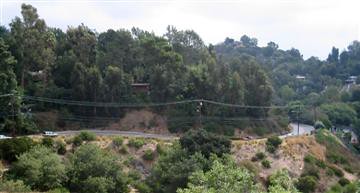Leaving the canyon

Twelve Thirty (Young Girls Are Coming To The Canyon) - The Mamas & The Papas
I don't want to ruin this song for you. Because it's a joyous thing. That flushed, sunny chorus of snug harmonies and c'mon-everybody handclaps perches at one of the summits of 60s pop music. But whenever I hear the words, "Young girls are coming to the canyon/And in the morning I can see them walking," I also think of these:
Adolescents drifted from city to torn city, sloughing off both the past and the future as snakes shed their skins, children who were never taught and would never now learn the games that had held the society together. People were missing. Children were missing. Parents were missing ... It was the United States of America in the cold late spring of 1967, and the market was steady and the G.N.P. high and a great many articulate people seemed to have a sense of high social purpose and it might have been a spring of brave hopes and national promise, but it was not, and more and more people had the uneasy apprehension that it was not.
Which is, of course, Joan Didion's "Slouching Towards Bethlehem." (And if you don't know why "of course" leave your computer immediately, find a bookstore or library and get your hands on a copy of Didion's collection of the same name. If you're a writerly person, it could change your life.) I've always trusted the cool, uneasy eye Didion casts on 60s mythology, not just because she's one of the most astute observers of American history unfolding. But also because she was born ten years too early to participate in the creation of the Boomers' self-serving narrative of how they almost saved the world. I trust her on California for the opposite reason: She's a native and first-person witness to a series of ruptures that healed poorly.
Is my bias plain? I hope so. Needless to say, I can't interpret L.A. 1967, Laurel Canyon, as "living free" to write or paint or make music or love or whatever, but instead feel it signifies crippling drugs and cults and homeless kids and the Manson murders two years later in nearby Benedict Canyon. Which doesn't mean East Coast exodus, or Turner's frontier thesis or however you want to explain the American impulse for Westward expansion, is invalid or one I don't know intimately. I went to college in the East, then moved to Los Angeles--for many reasons, but mainly because the film industry was there--and stayed for a couple years. And I learned something of the terrain, lexicon, mores. I went to parties in Beverly Hills and dated a surfer and suffered several small earthquakes before surviving one big one. As much as I loved browsing at Book Soup, I learned the essential book in that town is the Thomas Guide. Even so, I would fiercely defend L.A. from anyone who calls it cultural purgatory. But when I left I was relieved. And I miss it all the time. (And for some reason, I've been circling these whiplash memories lately.)
But that was the 90s, not the 60s and I'm trying (probably failing) to explain why a song that pretends to be "California Dreaming's" coda or perhaps the last word in The Mamas & Papas' larger project isn't just a little conflicted, but shadowed by anxiety, rooted in quicksand. Consider its final verse:
Muddy water casts no reflections
Images of beauty lie there stagnant
Vibrations bounce in no direction
But lie there shattered into fragments
But they're singing about New York, you might say, that dark and dirty place in the first verse. Are they? Compare the lyrics to those of Simon & Garfunkel's contemporaneous paean to continental drift, "America." They're specific with details and markers; when you're in Pittsburgh or on the New Jersey Turnpike, you know you are. "Twelve Thirty" is just vague enough that space comes off fractured and dislocated. And more to the point, that first line actually announces "I used to live in New York City," implying everything that follows is not New York. As is often true in the literature of California--from West to Steinbeck to Norris to Bret Easton Ellis--any articulation (even celebration) of its ethos is also its critique.
Buy The Mamas & The Papas (Amazon: US, UK)



6 Comments:
Really enjoyed this post.
What did you think about the movie "Laurel Canyon"?
This blog needs some Richard Buckner. ;-)
I like it quite a bit, Jon. But I suspect it has more to do with being an afficionado of films about L.A. as much as I am of books (and that's a film where the city is a strong character). And because Lou Barlow makes a cameo, of course. Otherwise, I suppose it's rather morally simplistic. Cholodenko's earlier High Art was a more nuanced, and probably better film.
Also my blogmate Jon reminded me post-post that I should have mentioned Mike Davis' City of Quartz. It was actually an intentional ommission, but the book's an absolutely essential read for anyone interested in the subject of L.A. (from a Marxist geographic perspective).
For some reason, I've always visualized a Stepford/zombie type thing -- sundazed blonde women with straight blonde hair and big mascara eyes and white peasant blouses, walking down some path through the sagebrush into the canyon -- while absolutely loving the song all the while. Thank you for posting my favorite John Phillips song.
See Amy how "easy" it is to write about music? Excellent post, thanks much for sharing.
Both enlightening and provocative. While I love the music of the Mamas and Papas, their lifestyles and life stories have always disturbed me.
Post a Comment
<< Home